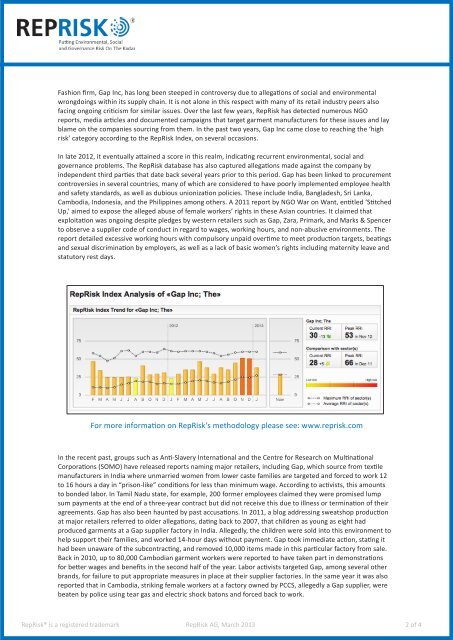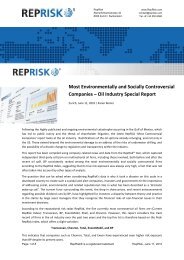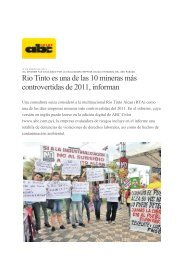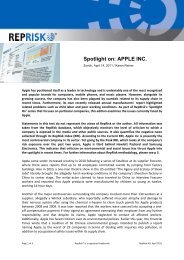Download report - RepRisk
Download report - RepRisk
Download report - RepRisk
Create successful ePaper yourself
Turn your PDF publications into a flip-book with our unique Google optimized e-Paper software.
Fashion firm, Gap Inc, has long been steeped in controversy due to allegations of social and environmental<br />
wrongdoings within its supply chain. It is not alone in this respect with many of its retail industry peers also<br />
facing ongoing criticism for similar issues. Over the last few years, <strong>RepRisk</strong> has detected numerous NGO<br />
<strong>report</strong>s, media articles and documented campaigns that target garment manufacturers for these issues and lay<br />
blame on the companies sourcing from them. In the past two years, Gap Inc came close to reaching the ‘high<br />
risk’ category according to the <strong>RepRisk</strong> Index, on several occasions.<br />
In late 2012, it eventually attained a score in this realm, indicating recurrent environmental, social and<br />
governance problems. The <strong>RepRisk</strong> database has also captured allegations made against the company by<br />
independent third parties that date back several years prior to this period. Gap has been linked to procurement<br />
controversies in several countries, many of which are considered to have poorly implemented employee health<br />
and safety standards, as well as dubious unionization policies. These include India, Bangladesh, Sri Lanka,<br />
Cambodia, Indonesia, and the Philippines among others. A 2011 <strong>report</strong> by NGO War on Want, entitled ‘Stitched<br />
Up,’ aimed to expose the alleged abuse of female workers’ rights in these Asian countries. It claimed that<br />
exploitation was ongoing despite pledges by western retailers such as Gap, Zara, Primark, and Marks & Spencer<br />
to observe a supplier code of conduct in regard to wages, working hours, and non-abusive environments. The<br />
<strong>report</strong> detailed excessive working hours with compulsory unpaid overtime to meet production targets, beatings<br />
and sexual discrimination by employers, as well as a lack of basic women’s rights including maternity leave and<br />
statutory rest days.<br />
For more information on <strong>RepRisk</strong>’s methodology please see: www.reprisk.com<br />
In the recent past, groups such as Anti-Slavery International and the Centre for Research on Multinational<br />
Corporations (SOMO) have released <strong>report</strong>s naming major retailers, including Gap, which source from textile<br />
manufacturers in India where unmarried women from lower caste families are targeted and forced to work 12<br />
to 16 hours a day in “prison-like” conditions for less than minimum wage. According to activists, this amounts<br />
to bonded labor. In Tamil Nadu state, for example, 200 former employees claimed they were promised lump<br />
sum payments at the end of a three-year contract but did not receive this due to illness or termination of their<br />
agreements. Gap has also been haunted by past accusations. In 2011, a blog addressing sweatshop production<br />
at major retailers referred to older allegations, dating back to 2007, that children as young as eight had<br />
produced garments at a Gap supplier factory in India. Allegedly, the children were sold into this environment to<br />
help support their families, and worked 14-hour days without payment. Gap took immediate action, stating it<br />
had been unaware of the subcontracting, and removed 10,000 items made in this particular factory from sale.<br />
Back in 2010, up to 80,000 Cambodian garment workers were <strong>report</strong>ed to have taken part in demonstrations<br />
for better wages and benefits in the second half of the year. Labor activists targeted Gap, among several other<br />
brands, for failure to put appropriate measures in place at their supplier factories. In the same year it was also<br />
<strong>report</strong>ed that in Cambodia, striking female workers at a factory owned by PCCS, allegedly a Gap supplier, were<br />
beaten by police using tear gas and electric shock batons and forced back to work.<br />
<strong>RepRisk</strong>® is a registered trademark <strong>RepRisk</strong> AG, March 2013 2 of 4











